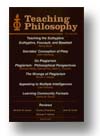|
teaching the euthyphro |
|
1.
|
Teaching Philosophy:
Volume >
30 >
Issue: 3
Harry Brod
Euthyphro, Foucault, and Baseball:
Teaching the Euthyphro
abstract |
view |
rights & permissions
| cited by
The central question of the Euthyphro is “Is the pious loved by the gods because it is pious, or pious because it is loved?” A baseball analogy explains this to students: “Does the umpire say ‘Out’ because the runner is out, or is the runner out because the umpire says ‘Out’?” The former makes the relevant knowledge public, making Socrates the appropriate secular moral authority, while the latter makes it religious, invoking Euthyphro’s expertise. Foucault’s aphorism that power is knowledge illuminates how the aristocracy stands behind Euthyphro, while Socrates empowers the democracy. An abstract epistemological question has important political consequences.
|
|
|
|
|
2.
|
Teaching Philosophy:
Volume >
30 >
Issue: 3
John Hardwig
Socrates’ Conception of Piety:
Teaching the Euthyphro
abstract |
view |
rights & permissions
| cited by
For Socrates, philosophy is self-examination. If the Euthyphro is still to be philosophy in this sense, it must challenge people living now. This paper offers a reading that does this. First, a better case is made for something like the kind of expertise Euthyphro claims and for his position about piety. Second, Socrates and Euthyphro embody different views about the kind of expertise that would be relevant to discovering and engendering piety. Finally, Socrates’ unorthodox conception of piety is made explicit. With these features highlighted, the Euthyphro still possesses the power to provoke and challenge.
|
|
|
|
|
on plagiarism |
|
3.
|
Teaching Philosophy:
Volume >
30 >
Issue: 3
Richard Reilly, Samuel Pry, Mark L. Thomas
Plagiarism
abstract |
view |
rights & permissions
| cited by
Plagiarism is often equated with theft, but closer inspection reveals plagiarism’s distinctive dimensions. Fundamentally, plagiarism is a form of deception, whereby the plagiarist uses the instructor as a means toward the plagiarist’s own end. Implicitly asking the instructor for a fair and accurate evaluation of the student’s abilities, the plagiarist at the same time sabotages the instructor’s capacity to make that judgment, thereby violating a duty inherent in the student-teacher relationship. Moreover, every act of plagiarism damages the plagiarist’s integrity, thereby subverting his/her own well-being, while contributing as well to a widespread devaluing of education for both the individual and society.
|
|
|
|
|
4.
|
Teaching Philosophy:
Volume >
30 >
Issue: 3
Brook J. Sadler
The Wrongs of Plagiarism:
Ten Quick Arguments
abstract |
view |
rights & permissions
| cited by
I offer ten arguments to demonstrate why student plagiarism is unethical. In sum, plagiarism may be theft; involve deception that treats professors as a mere means; violate the trust upon which the professor-student relationship depends; be unfair to other students in more than one way; diminish the student’s education; indulge vices such as indolence and cowardice; foreclose access to the internal goods of the discipline; diminish the value of a university degree; undercut creative self-expression and acceptance of epistemic limitations; and undermine the vital interpersonal component of higher education. Plagiarism warrants severe penalties that effectively combat the student’s presumptive competitive strategy for individual success.
|
|
|
|
|
articles |
|
5.
|
Teaching Philosophy:
Volume >
30 >
Issue: 3
Lisa Cassidy
Appealing to Multiple Intelligences in the Classroom:
Using Stick Figures to Teach Philosophy
abstract |
view |
rights & permissions
| cited by
This article urges teachers of philosophy to “remember Meno’s slave boy.” In Plato’s Meno, Socrates famously uses a stick to draw figures in the dust, andMeno’s uneducated slave boy (with some prompting by Socrates) grasps geometry. Plato uses this interaction to show that all learning is, in fact, recollection. Regardless of the merits of that position, Socrates’ conversation with the slave boy is an excellent demonstration that understanding is aided by appealing to the different talents or “intelligences” of students. Similarly, I advocate using stories and hand-drawn stick figure cartoons to teach philosophy.
|
|
|
|
|
6.
|
Teaching Philosophy:
Volume >
30 >
Issue: 3
James B. Gould
Learning Community Formats
abstract |
view |
rights & permissions
| cited by
College courses are often disconnected both from other disciplines and from student’s lives. When classes are taught in isolation from each other students experience them as unrelated fragments. In addition, college courses often lack personal meaning and relevance. Interdisciplinary learning communities—classes in which the subject matters of two or more fields are integrated—can help overcome these two problems by providing an education that is holistic and coherent. In this paper I report on how philosophy courses can be blended with English classes and how theoretical perspectives can be connected to student’s personal lives.
|
|
|
|
|
reviews |
|
7.
|
Teaching Philosophy:
Volume >
30 >
Issue: 3
Michael W. Austin
Personal Virtues:
Introductory Essays , ed. Clifford Williams
view |
rights & permissions
| cited by
|
|
|
|
|
8.
|
Teaching Philosophy:
Volume >
30 >
Issue: 3
Timothy Chambers
Thinking
view |
rights & permissions
| cited by
|
|
|
|
|
9.
|
Teaching Philosophy:
Volume >
30 >
Issue: 3
John M. Koller
Studies in Vedanta:
Essays in Honour of Professor S. S. Rama Rao Pappu, ed. P. George Victor and V. V. S. Saibaba
view |
rights & permissions
| cited by
|
|
|
|
|
10.
|
Teaching Philosophy:
Volume >
30 >
Issue: 3
Michael P. Nelson
The Pine Island Paradox
view |
rights & permissions
| cited by
|
|
|
|
